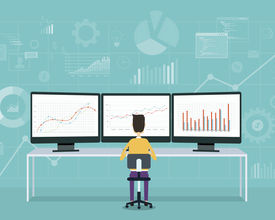Data is the bloodstream of your event. You can’t do much (including measure, scale, and excel) without having a clear picture of what’s happening before, during, and after the event. Not an easy task to accomplish.
As the entrepreneur Kevin Van der Straeten notes in his book on event management, “In view of the large number of different processes involved in the organization of an event, there is no one single method you can use to collect all the data you need. Nevertheless, you must do all you can to be as comprehensive as possible.”
You might be saying to yourself, “Why is data so important for my event, and why should I collect it at every stage of the planning process?”
First, data can help you can detect unforeseeable challenges on time so you can change them and avoid possible issues. Second, having a good understanding of the event’s performance indicators will leave you properly equipped to make better decisions. Finally, there’s a strong correlation between data and your event strategy. How can you be sure you’re reaching your goals without knowing you have maximum control over different planning, logistics, and marketing aspects of the event?
Ongoing measurements will help you avoid unpleasant situations and enhance your attendees’ experiences. How can you do that? Here’s a list of data you can collect at every stage of your next event:
Before the event
- Marketing performance - Start measuring the event indicators with the efficiency of your marketing campaign. Depending on your promotion strategy, you might have different KPIs. For example, if you promote your event via email marketing, you’ll be looking at the open and click-through rates. If you decide to deploy your social media arsenal, you’ll want to review statistics related to your target group’s engagement and reactions to your sponsored content. If your secret is content marketing, you’ll be looking at indicators that show the number of website visitors, article views, comments, etc. Depending on the data you get, you’ll be more agile in your marketing efforts and improve those areas that aren’t producing immediate or satisfactory results.
- Attendee information - Whether you’ll be handpicking attendees (deciding whose registration to accept) or accepting everyone, having detailed information about your guests is crucial to provide a meaningful experience. This type of information can vary from basic demographic details to dietary preferences or restrictions.
- Registration rate - Another important piece of data you’ll be looking at is the number of attendee registrations. A low number will imply that you might need to change your marketing strategy, while a large number might indicate that you need to find a bigger venue.
- Payments - Having a data dashboard that updates payment information in real time will help you understand the possible event ROI and even choose to spend some of this money on improving some of the planning aspects.
- “Churn” number - You might gain access to the potential attendees’ online behavior through different event platforms or apps. For example, if you can see how many people (and even their names or emails) started to register and then stopped halfway through the procedure, you’ll have the necessary information to improve the process (if it’s an UI/UX problem), or even email those potential guests to see if they need additional information to complete the registration.
During the event
- Check-in rate - The number one piece of data you’ll be interested in is the event check-in rate. This data will give you a better picture about the attendance rate.
- Number of interactions via app - If you’re using an event mobile app, you’ll want to evaluate its ROI by calculating how many times your attendees used and interacted with it.
- Networking data - When setting up multiple one-to-one meetings during your event, you’ll acquire new data. For example, you’ll know your attendees’ meeting schedule, so you can use that information to quantify their interest or engagement in the dynamic. This data will help you understand if you’ve done a good job (or not) of connecting the offer and demand.
- Attendance rate per session - You can even evaluate the quality of your sessions by looking at the attendees’ interest level regarding certain speakers. This is especially valuable when you’re running multiple knowledge sessions at the same time. You’ll have to check in your attendees each time they enter a new room to get a truly accurate rate.
- Engagement rate - Did your attendees participate in live polls and Q&A sessions during the event? You can—and should—measure this indicator to decide if you’ve provided the necessary conditions to make the engagement easy and natural.
After the event
- Email open and click-through rates - After the event, you’ll be sending lots of thank-you and commercial emails. You can evaluate the effectiveness of this strategy via email open and click-through rates (as in the case of email marketing) along with people’s responsiveness.
- Survey feedback - Attendee feedback is one of the best ways to tell if your event was a success. Gather their opinions through a survey, and encourage them to be completely transparent and honest in their answers (and tell them why, too—so you can see what worked and what didn’t for future editions).
- Leads and sales - If you’re planning a conference or a seminar for a brand or business, you’ll want to look at the marketing boost you attained through analyzing the number of leads and sales immediately after the event. This way, you’ll know if you achieved your desired results or if you have to rethink your event strategy next time.
Wrap-up
Looking at event data is not something you should take lightly. You should always be in touch with what’s happening and have a clear understanding about how your planning efforts are unfolding. Make sure you pinpoint the moments and indicators you want to monitor and set up a measuring infrastructure to streamline the process.








